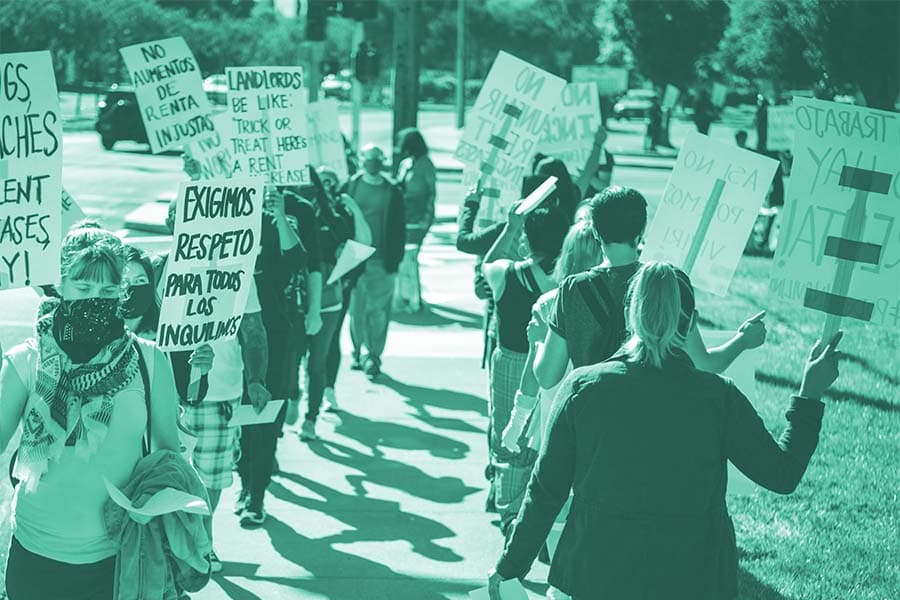What is a Just Transition?
By now, it’s clear to most of us that climate change isn’t just an environmental problem, it’s a social, political, and economic problem, too. An economy based on endless extraction and growth has poisoned our air, water and soil, intensified extreme weather events, and led to higher prices for basic necessities like food, housing, water, and energy. It has socialized the costs and privatized the gains, concentrating wealth in the hands of a powerful few, and concentrating poverty and pollution in communities with the fewest material resources to respond. This system cannot last; our planet can no longer sustain it and our people will no longer tolerate it.
So what does a Green New Deal need to look like to transform our economy from an extractive one, into a web of local regenerative economies? What are the actual policies, investments, and ways decisions get made about our future that need to change in order to build an economy that benefits the people who have paid the highest costs of the extractive economy? And how do we build the power needed for such a political, economic, and ecological transformation?
APEN has spent the last two decades organizing with Asian immigrant and refugee communities in Oakland and Richmond to answer these questions. In creating the building blocks for a just transition, they have learned that real transformation requires ending the bad, building the new, and putting the people who have been paying the cost of the extractive economy at the center of solutions.
Ending the Bad
Whether it’s oil fields, fracking wells, industrial agriculture, coal mines, dirty power plants, industrial freight or massive refineries, the fossil fuel economy is poisoning the air we breathe, the water we drink, the land that we grow food on, and the people we love. For people living next to big pollution sources, the practices that sustained them for generations – growing their own food, raising a few animals, and fishing from local bodies of water – are now a health risk.
For a Green New Deal to succeed, it has to stop big polluters from poisoning our families and destabilizing our climate. This means an end to public subsidies for fossil fuels. This means no new permits for big polluters, real caps on emissions at the facility level where they are created, and the rapid phase out of oil and gas production.
It means saying no to multibillion-dollar bailouts for investor-owned utilities and skyrocketing electric bills for the rest of us. We can do better than pour billions into patching up an antiquated energy infrastructure that relies on nearly 200 dirty gas plants to generate electricity and carry it across dangerously long distances.
Building the New
In addition to ending the bad, we’ve got to build the new – new ways of powering our neighborhoods, sustaining our communities, and making decisions about our futures.
The New Deal of the 1930s remade our economy through public works projects like the Tennessee Valley Authority, which brought infrastructure, jobs and power to millions of people, starting in isolated rural areas. Today, we need a Green New Deal that will stabilize the climate and build local regenerative economies, starting in the neighborhoods most impacted by racism, poverty and pollution. The original New Deal excluded millions of Black workers and families from its benefits, and we can’t make the same mistakes this time around.
In places like Oakland and Richmond, people have already begun to imagine what a future without big polluters could look like. APEN has developed plans to turn municipal buildings, apartments, schools, churches and community centers into sites for clean renewable energy generation so that working class neighborhoods – not just wealthy households – can benefit from clean energy and cost savings.
APEN’s members have proposed creating climate resilience hubs in each neighborhood with microgrids and energy storage in places already designated as local evacuation centers. This will help communities with the fewest material resources to weather increasingly devastating climate disasters.
As we increase clean energy sources, we can unplug dangerous gas plants and ensure that workers in the fossil fuel industry transition into jobs in the renewable energy economy. That means training and hiring thousands of workers to build the infrastructure of community-owned solar, wind and energy storage public works projects. These must be built in every city, but especially in places like Richmond, where people have been unfairly burdened by dirty fossil fuels.
Most importantly, we need to put power back where it belongs – in the hands of workers and communities. Through the Our Power Coalition, APEN is bringing together Black, Brown, Asian, and Indigenous communities to take back control of our city council, incubate worker-owned cooperatives, form community land trusts, and bring young people into community supported agriculture projects.
Leadership from the Frontlines
As climate disasters intensify and our sense of urgency around climate change grows, we need the leadership and clarity of frontline and indigenous communities.
The same corporations that got us into the mess pretend they can get us out with profit-driven schemes like cap-and-trade and calls for ‘net zero’ emissions. They’ve even got big environmental organizations spreading a carbon-counting version of trickle-down economics: that if we can reduce carbon emissions by enough to keep the temperature below 2 degrees Celsius, it will somehow address the issues at the root of our ecological crises: massive inequality and the drive toward endless growth.
We can’t waste more time on false solutions. It’s time to connect with frontline and indigenous organizations locally, and support demands that advance a just transition. Together, we’re stronger than the crises that threaten us. As the young people hitting the streets this month remind us – the clock is ticking.
For more information on the Just Transition Fund at EBCF, contact David Pontecorvo at dpontecorvo@eastbaycf.org.
